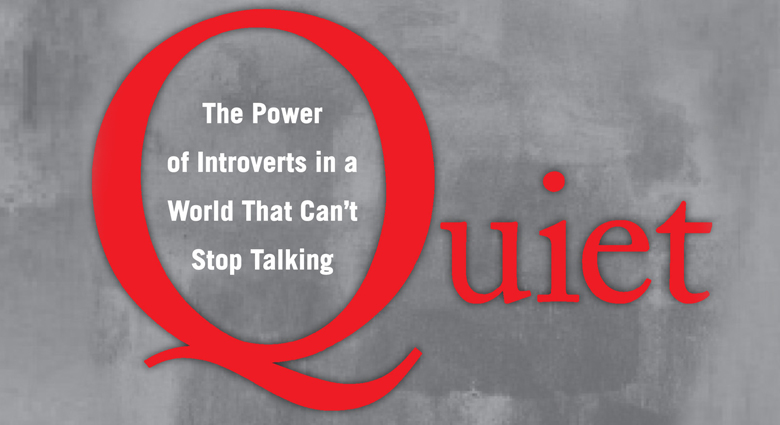Actionable Summary by Chris Taylor
Based on the book by Susan Cain
"Probably the most common - and damaging - misunderstanding about personality type is that introverts are antisocial and that extroverts are pro-social. ... neither formulation is correct; introverts and extroverts are differently social."
Introverts recharge by spending time on their own. Extroverts recharge by connecting with other people
Quiet, page 226
There are people on your team who think deeply. They will wrestle with a problem longer than most and they excel in strategizing and solving complex problems. They engage in activities that align with their convictions and typically present opinion or insights from a well researched, well thought out place. Would you like to know who these people are in your organization?
They're the ones not speaking up at your team meetings. They're the ones who were against your "open concept" office layout (though you may not have heard them say so). They are your introverts.
When I say the word "introvert", what comes to mind?
After having now read (and thoroughly enjoyed) Susan Cain's Quiet: The Power of Introverts in a World that Can't Stop Talking , my appreciation of the term has been radically altered. No longer does the word conjure images of social awkwardness and shyness, but rather the quiet fortitude that comes from someone in touch with a deeper level of thought and reflection - people who take stock of what they say before they say it and engage in activities and conversations that align with their convictions.
Despite the fact that Introverts make up 30% - 50% of the population, we're living in a decidedly Extrovert-celebrating time and, as a result, some of your top people are being radically underutilized in your business team.
Golden Egg:
All Things Being Equal
"If we assume that quiet and loud people have roughly the same number of good (and bad) ideas, then we should worry if the louder and more forceful people always carry the day. ... yet studies in group dynamics suggest that this is exactly what happens."
Quiet, page 51
One of my favorite stories from Quiet ( a book, by the way, loaded with studies and anecdotes) is Cain's experience sitting in on a first year Harvard Business School class. The exercise she was auditing was called the Subarctic Survival Situation , a role-play situation in which the class members are put into groups and, as a team, challenged with ranking the importance of 15 items that they "salvaged from their crash-landed plane". The goal is to work synergistically - assumedly pooling the collective knowledge of the group - to rank the importance of their supplies as closely to a professional's as possible.
In this particular class, one of the students had "extensive experience in the Northern backwoods." But he was also a quiet person. An introvert. The group didn't listen to his suggestions (instead following the guidance of the loudest members of the group), to disastrous results.
GEM #1:
Rethink Group Think
"We're so impressed by the power of online collaboration that we've come to overvalue all group work at the expense of solo thought. We fail to realize that participating in an online working group is a form of solitude all its own."
Quiet, page 89
In addition to the volume and conviction with which they may share their ideas, one of the fundamental differences between introverts and extroverts is they way in which they go about solving problems. Where extroverts are quite happy to sit around a boardroom table, engaging in dialogue and building off each other's ideas, introverts need space (and time) to reflect on a question or issue before sharing their fully formed, well thought out ideas with the rest of the team. All the benefits that the "thinking out loud" extroverts gain from group exercises, introverts experience through isolated reflection or one-to-one conversation. When you consider that up to half of your team mates are actually introverts (and this may include you!) this means that traditional "brainstorming" exercises, as we know them, can miss out on tapping some of the top ideas from smart individuals.
When your situation calls for the best ideas - not just the loudest or most impassioned - try allowing room for people to generate their own ideas, before attempting to "collaborate" as a group. Having team members submit their ideas in writing, before discussion, can be an excellent (and easy) way to open the floodgates to diverse input.
GEM #2:
Time Outs
"'Restorative niche' is Professor Little's term for the place you go
when you want to return to your true self."
Quiet, page 219
Introverts recharge by spending time on their own. Extroverts recharge by connecting with other people. Regardless of which camp you fall into, very few of us (if any) are fortunate enough to automatically fill our days with the mix of solitude and connectedness that leaves us perfectly balanced. It's important, as Cain explains in Quiet , to find those times to "balance" by engaging in those activities that match our temperament.
If you're an introvert who spends your work day with people, do your best to find some quiet time at lunch, or on short walks between activities. If you're an extrovert working on something that requires long periods of isolation, try to build some interaction into your day - again, it could be as little as a lunch with a co-worker or friend.
More important still, work at being aware of what recharges those who are important in your life - be it a spouse, child, co-worker or subordinate. Do your best to support their need for "balance" and - in the case of introverts - don't take it personally when they need time alone every once in a while.
While Quiet is most definitely a book of value for introverts, it's also a great reminder for the rest of us that we're all human. We all have wonderful features that make us unique, and that those characteristics truly shine when we're given the opportunity to be our natural selves.
"If you're a manager, remember that one third to one half of your workforce is probably introverted, whether they appear that way or not. ... Make the most of introverts' strengths - these are people who can help you think deeply, strategize, solve complex problems, and spot canaries in your coal mine."
Quiet, page 265




.png)




What Did You Think?